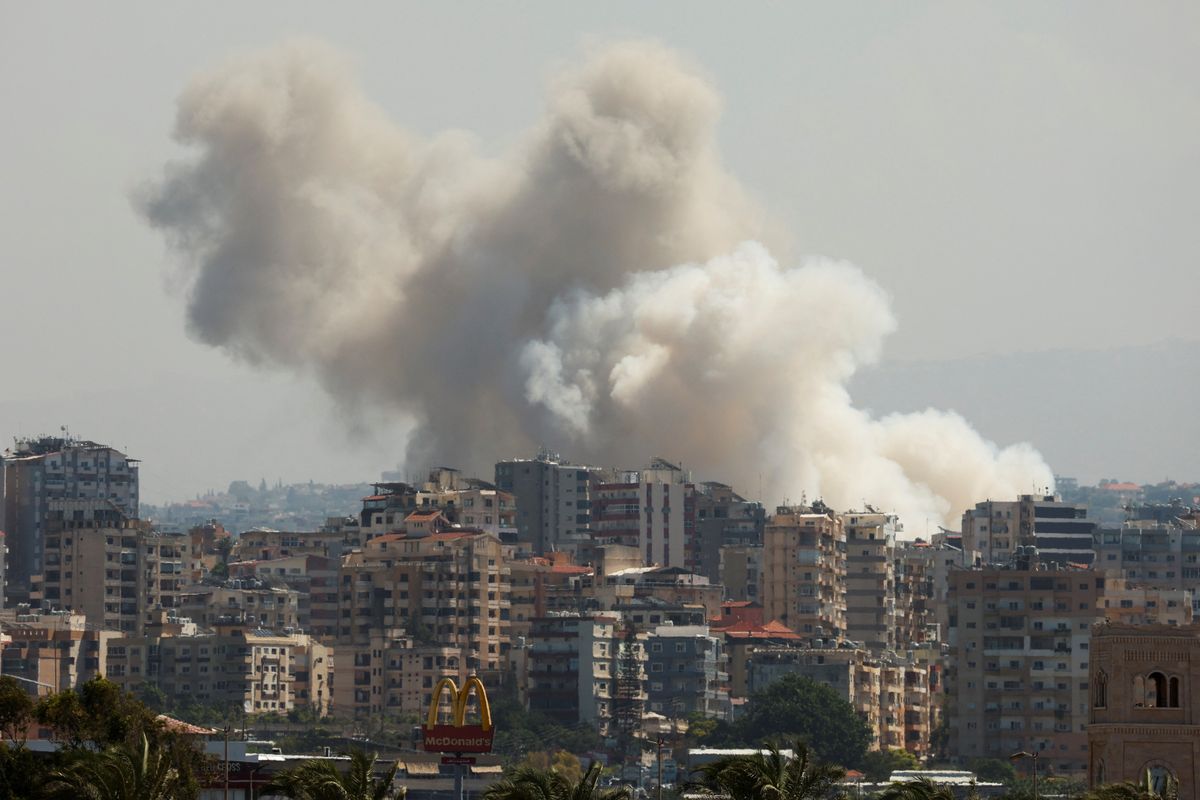Reuters
News Agency Partner
Reuters is a leading source of news and information, delivering fact-based reporting and expert analysis on international events and trends.
AFP
News Agency Partner
AFP is a renowned international news agency, delivering comprehensive and reliable reporting on global events, trends, and issues.

Smoke billows over southern Lebanon following Israeli strikes, as seen from Tyre, southern Lebanon
Reuters
At least 356 people, including 24 children and 42 women, were killed and 1,246 wounded in Israeli strikes on southern Lebanon on Monday, the country's health minister said during a press conference.
The health ministry said in a previous statement updating figures that "children, women and paramedics" were among the casualties.
Speaking on condition of anonymity as he was not authorized to speak to the press, a Lebanese official said Monday was Lebanon's deadliest day since the end of its 15-year civil war.
Tens of thousands of people are fleeing southern Lebanon "due to Israeli atrocities," Lebanese Minister Nasser Yassin, who is coordinating the crisis response, said.
The Israeli military has launched its most extensive wave of air strikes against Iran-backed Hezbollah, targeting southern Lebanon, the eastern Bekaa Valley, and northern regions near Syria in nearly a year of conflict. Since Monday morning, the military reported striking approximately 800 Hezbollah targets in southern Lebanon and the Bekaa Valley alone.
"Among the targets struck were buildings where Hezbollah hid rockets, missiles, launchers, UAVs and additional terrorist infrastructure," the military said in a statement.
The Israeli military later added that it would be targeting Beirut, confirming that it had conducted a targeted strike on senior Hezbollah leader Ali Karaki in the southern suburbs of the capital. Karaki's fate is currently unknown.
Asked by reporters about a possible Israeli ground incursion into Lebanon, Israeli military spokesperson Rear Admiral Daniel Hagari said "we will do whatever is needed" in order to return evacuated residents of northern Israel to their homes safely, a war priority for the Israeli government.
The latest attacks came amid some of the heaviest cross-border exchanges of fire in a conflict raging alongside the war between Israel and Hamas in Gaza. Hagari called on residents of south Lebanon to keep away from Hezbollah posts.
He said that Hezbollah over the years has stashed weapons, including cruise missiles, in houses and buildings throughout southern Lebanon, and called on residents to stay away from these sites.
Hagari presented in a media briefing an aerial video of what he described as Hezbollah operatives trying to launch cruise missiles from a civilian house in Lebanon, and the subsequent Israeli strike moments before it was launched.
He said Israel began striking Hezbollah posts in Lebanon after identifying an intention to fire on Israel.
Israeli warplanes carried out an intense wave of air strikes on towns along Lebanon’s southern border and even further north on Monday morning, according to Reuters witnesses.
Reuters reporters in the southern port city of Tyre could hear warplanes flying low over southern Lebanon and hear a series of air strikes nearby.
Hezbollah's al-Manar television reported Israeli airstrikes targeting the outskirts of many towns and villages in the south and the Bekaa Valley in eastern Lebanon. Footage showed columns of smoke rising over the south.
In addition to striking the Bekaa Valley region of eastern Lebanon, warplanes also carried out airstrikes on the Hermel area in northern Lebanon, Hezbollah's al-Manar reported.
Hezbollah and Israel exchanged heavy fire into Sunday, as the Lebanese group sent rockets deep into northern Israeli territory after facing intense bombardment.
Israeli Defence Minister Yoav Gallant said operations would continue until it was safe for evacuated people on his side of the border to return - also setting the stage for a long conflict as Hezbollah has vowed to fight on until a ceasefire in the parallel Gaza war.
Hezbollah has come under unprecedented pressure since thousands of pagers and walkie-talkies used by Hezbollah members exploded last week.
The attack, an unprecedented breach of security, was widely blamed on Israel, which has not confirmed or denied responsibility.
Lebanese official media: Israel sending phone warnings to evacuate
Lebanese official media said on Monday people were receiving Israeli phone warnings telling them to evacuate, and Information Minister Ziad Makary's office told AFP it had received one of the calls.
"Citizens in Beirut and a number of areas are receiving landline telephone warning messages whose source is the Israeli enemy, asking them to quickly evacuate where they are," the Lebanon's official National News Agency (NNA) said.
The minister's office said it received a landline phone call and when staff responded, there was a "recorded message" telling them to evacuate.










Comments
See what people are discussing